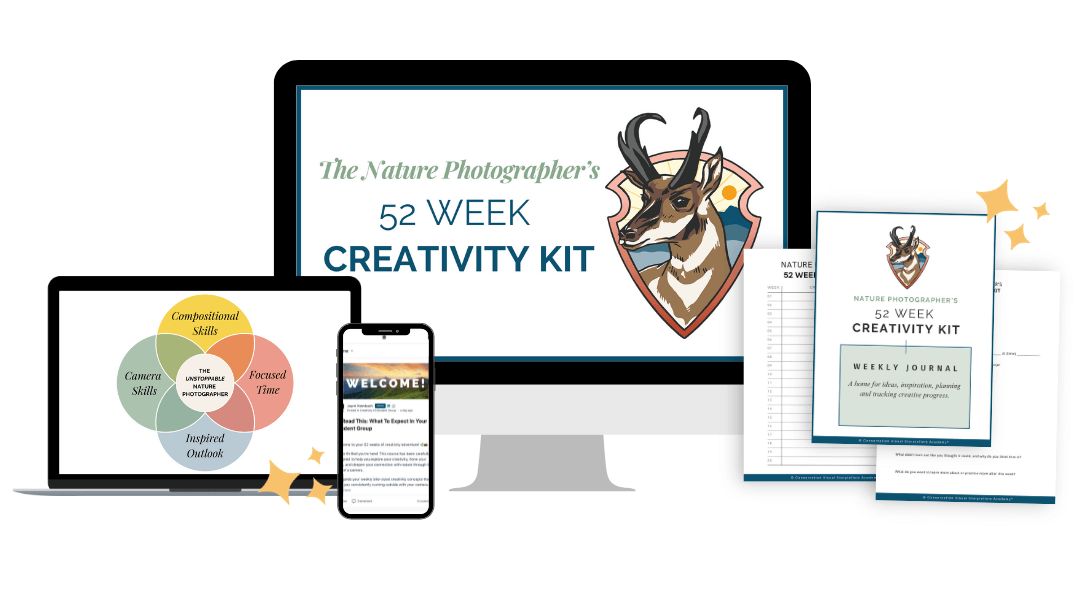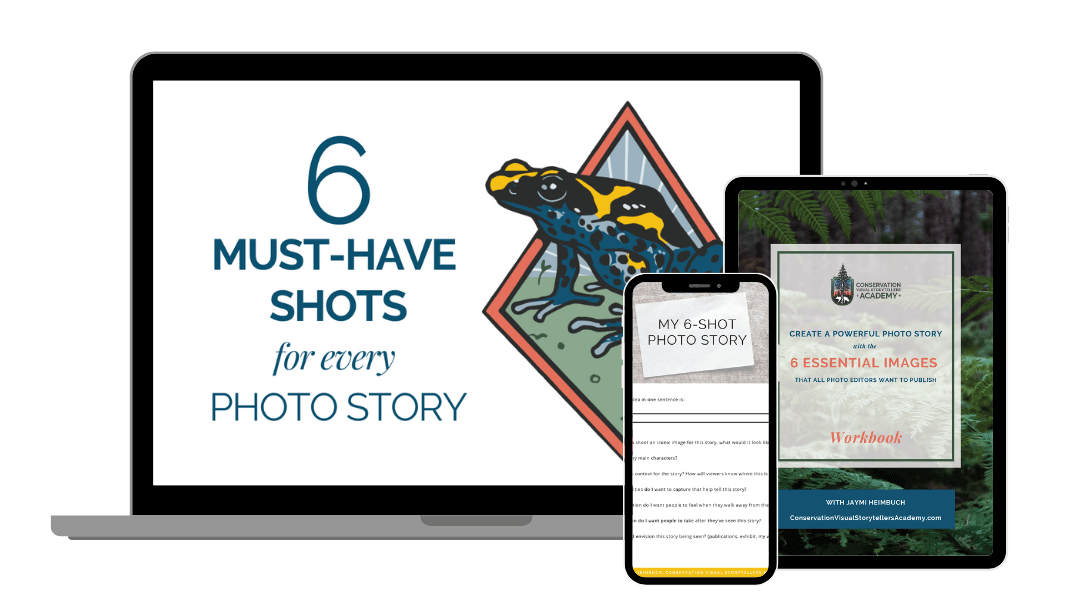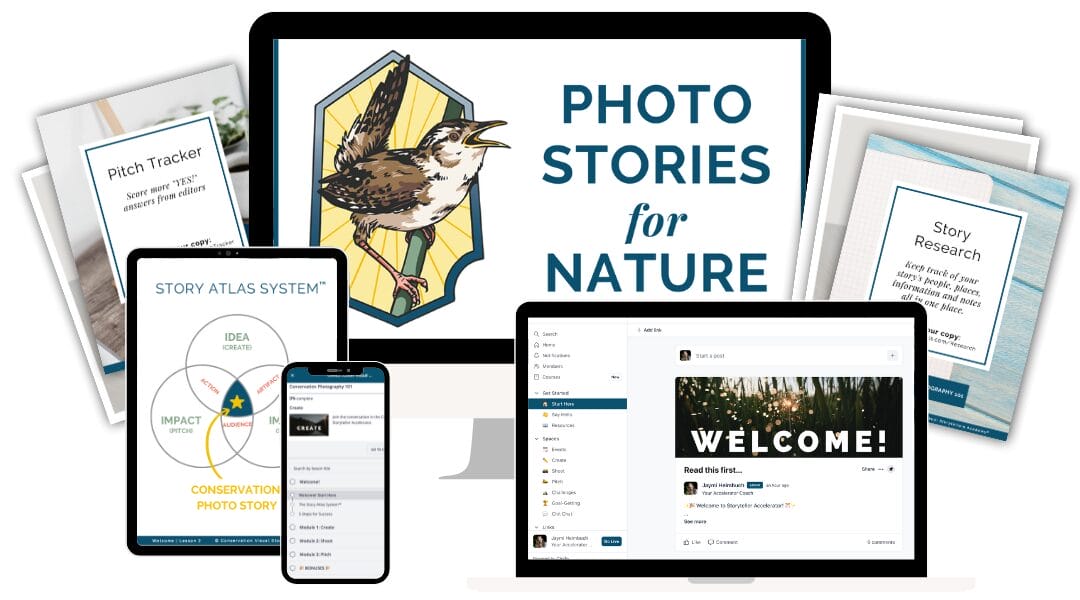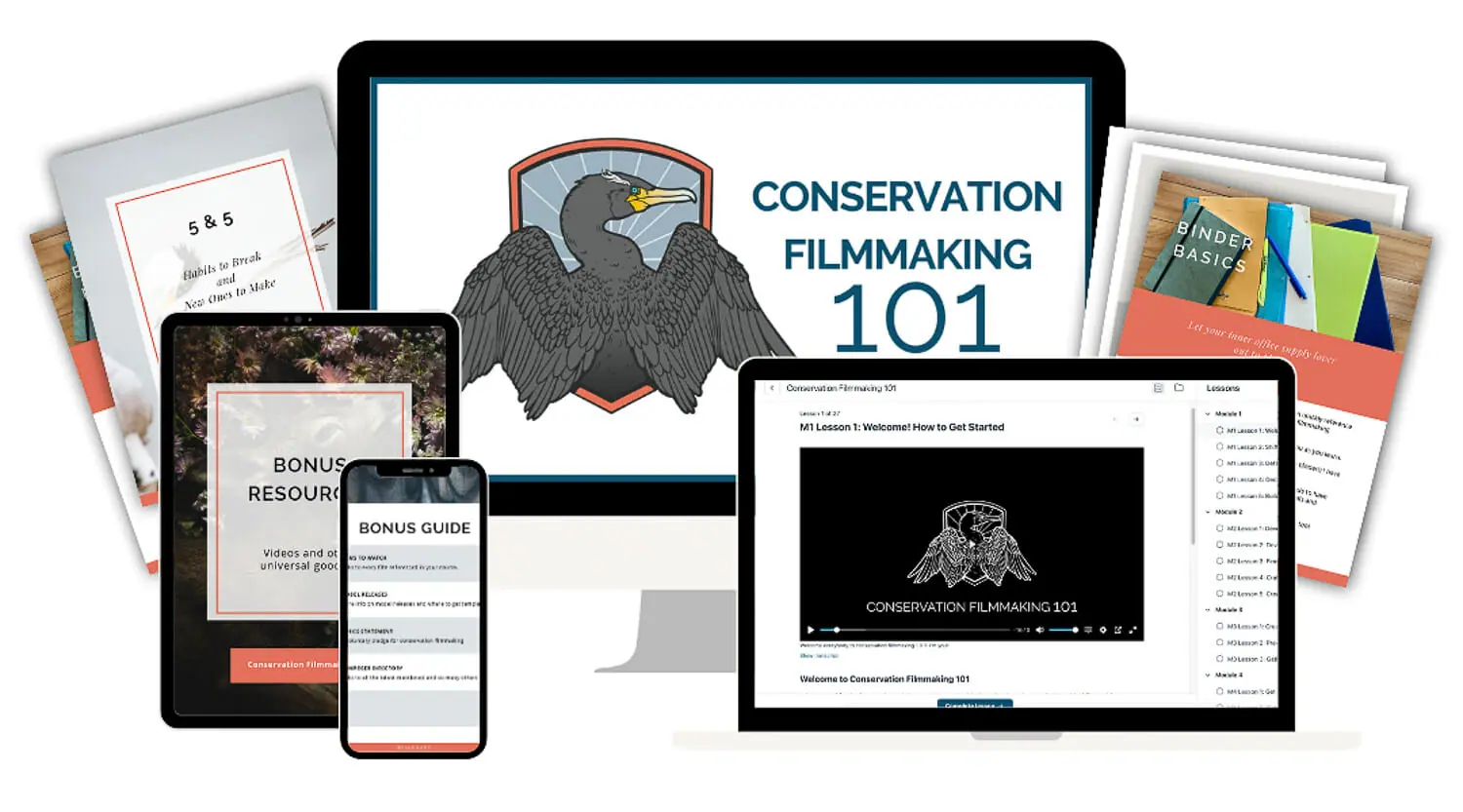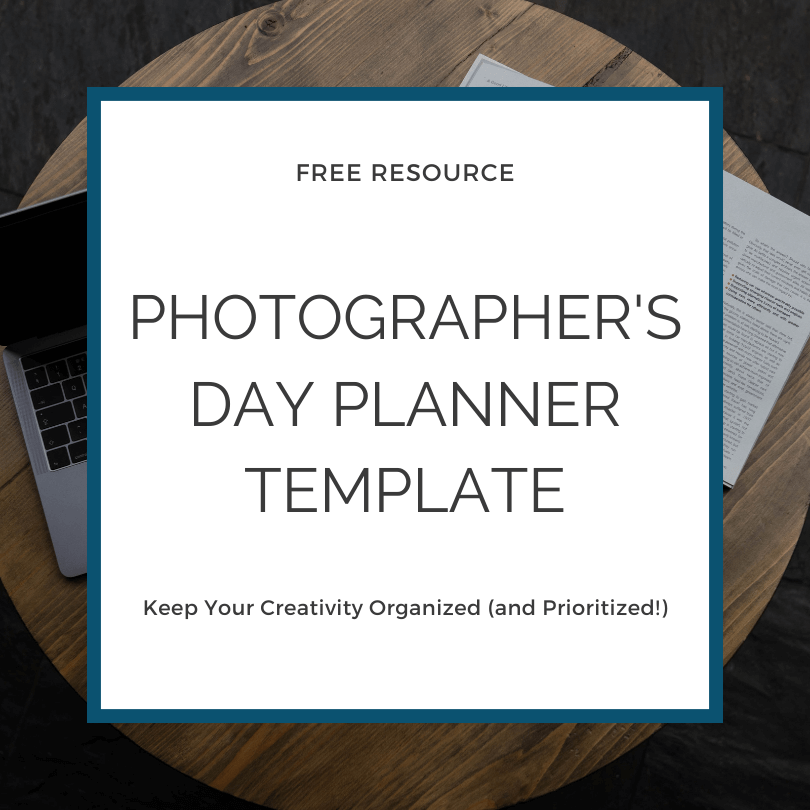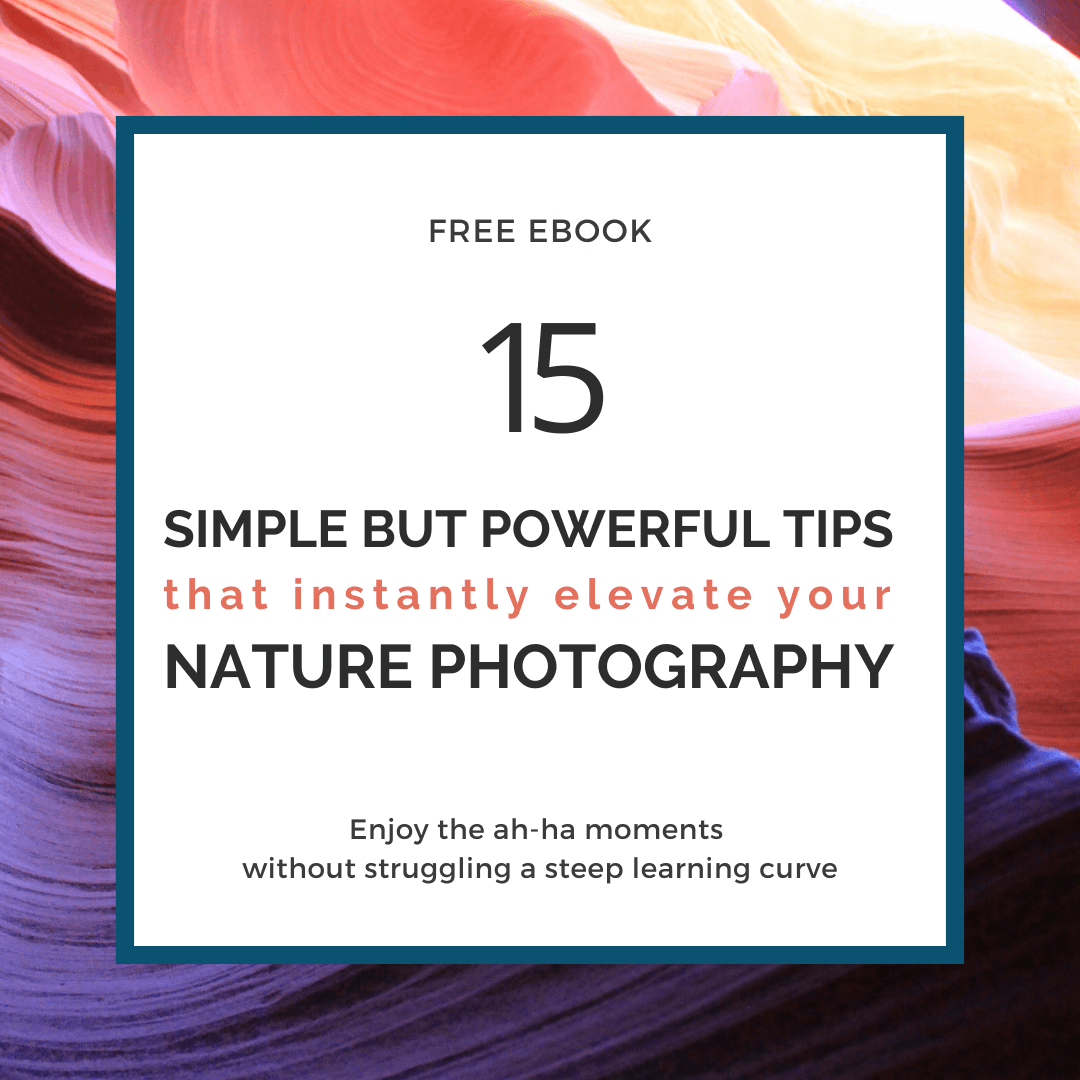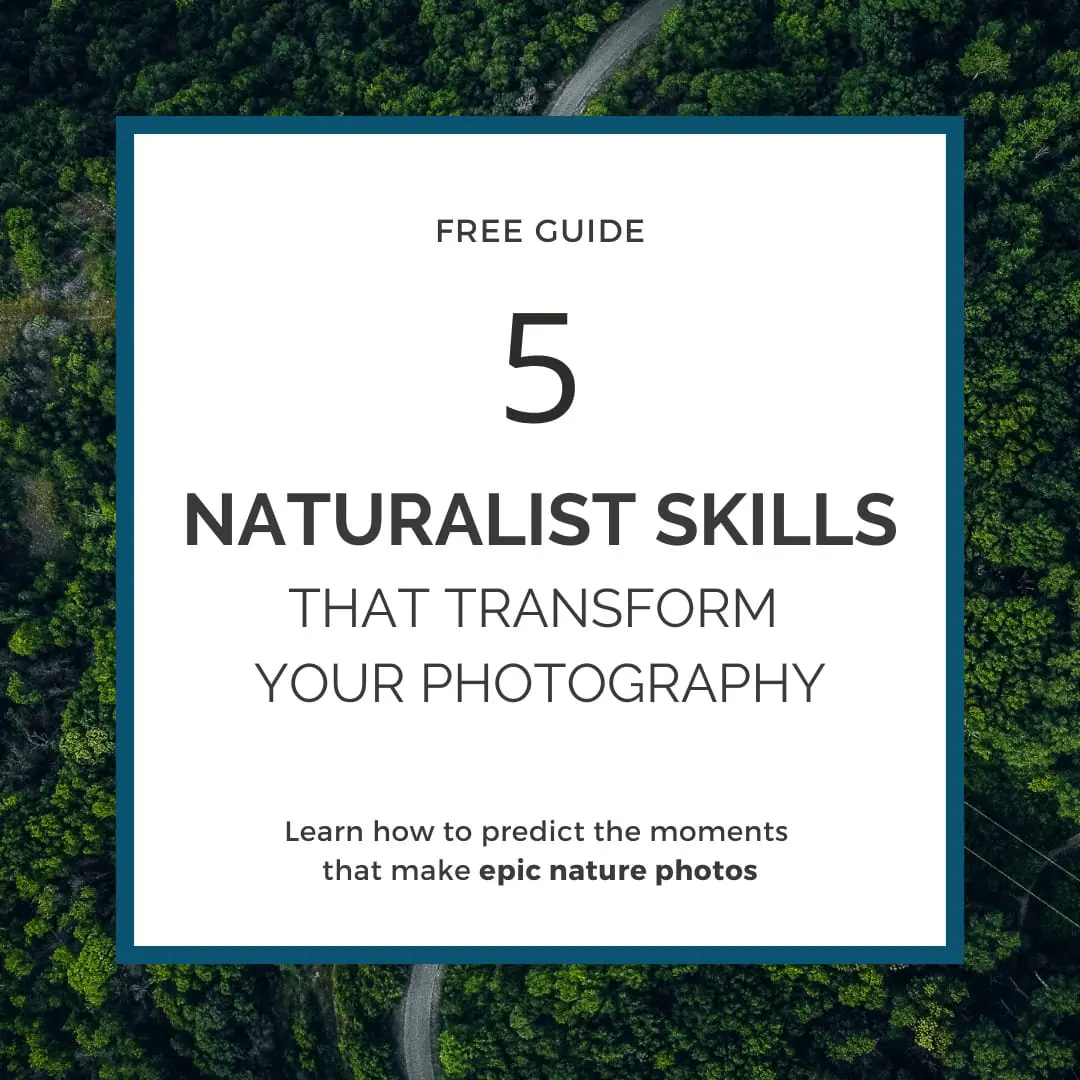All About Photography Mentorships with Sabine Meyer of Audubon Magazine
How do you find a mentor? How do you shape a mentor-mentee relationship? What are the dos and don'ts? These questions and more are answered by a talented photo editor with decades of experience guiding photographers in their storytelling journey.
We commonly talk about things like gear, settings, storytelling, pitching… all these important yet process-oriented topics around how to create images and get them out into the world.
But one part of this field that isn't talked about nearly as frequently, and which is vitally important to success inside of conservation visual storytelling, is the topic of mentorship.
This is a topic I'm frequently dipping into because inside of Wild Idea Lab, we tackle questions like:
- What does a mentorship look like?
- How do you find a mentor?
- What structure does a mentor-mentee relationship take once you find someone that you wanna be mentored by?
- And what are some of the dos and don'ts of being a really good mentee?
This is because mentorship is a big, BIG part of finding success and growth.
That's why I asked Sabine Meyer, Director of Photography at National Audubon Society and a Mentor in the upcoming Mentor Program at Conservation Visual Storytellers Academy, to talk with us about her philosophy around mentorship and her experiences in 30 years of working in visual storytelling.
The way that Sabine thinks about mentorships is truly uplifting and helpful. You'll walk away from this episode with a wonderful outlook on what mentorship can do for you in your evolution as a photographer or filmmaker.
You'll Learn:
- Characteristics of a great mentor
- What a mentorship looks like (and it's probably not what you picture)
- What mentors get out of the mentorship relationship
- Dos and Don'ts of being a really good mentee
Resources Mentioned
Episode 075: All About Photography Mentorships with Sabine Meyer of Audubon Magazine
Shownotes: ConservationVisuals.com/75
(Digitally transcribed, please forgive any typos)
Jaymi Heimbuch:
Some of the really common topics of conversation that we have inside of conservation photography and filmmaking, visual storytelling in general, are things like gear and settings and storytelling and pitching, and all of these things that are very process-oriented for how to get your images crafted and out into the world. But one part of this field that isn't talked about nearly as frequently and that is really essential to success inside of conservation visual storytelling is the concept of mentorship.
0:00:33.9 JH: Now, I'm hearing questions like, "Well, what does a mentorship look like, and how you find a mentor, what structure does a mentor-mentee relationship take once you find someone that you wanna be mentored by? And what are some of the dos and don'ts of being a really good mentee?"
0:00:55.5 JH: And in fact, we held a bonus live event recently where we brought in three sets of mentor-mentees and really delved into the various shapes that a mentorship could take and how to behave. We had Suzi Eszterhas and Susan McElhinney, we had Jen Guyton and Morgan Heim, and we had me and my own mentor, Sabine Meyer, and Sabine is the Director of Photography at Audubon.
0:01:20.9 JH: She's been an invaluable resource to me as I turned to her for mentorship to start working through a project that I've been working on and have often found myself stuck in, and her feedback has been so helpful in letting me sort of see my sticking points and move through them. The way that Sabine thinks about mentorships, I think is really amazing and helpful, and so I asked her to come onto the podcast today and talk about her philosophy around mentorships and what you can do as a really great mentee to get the most out of them, as well as how you can recognize a great mentor who's gonna help you and really collaborate with you to help you grow as a photographer or a filmmaker or a visual storyteller in any sense.
0:02:08.7 JH: And we also delve into a little bit about the mentor program that we're running at Conservation Visual Storytellers Academy, because Sabine could also potentially be your mentor.
0:02:20.0 JH: Sabine, myself and Morgan Heim are the three mentors inside of a 12-week mentorship program that is geared toward helping you complete a photography project. So whether you've found yourself stuck or you aren't really sure how to develop the style or the voice, or you really just need some guidance, well this 12-week program is a perfect opportunity for you to have not just one, not just two, but three mentors all with different specialties inside of visual storytelling helping to guide you through to the finish line of your project.
0:02:56.9 JH: So Sabine's here to talk about all things mentorship, and I hope that you enjoy all that Sabine has to say because she really brings so much information and insight into this episode. Alright, let's dive in!
[music]
0:03:14.6 JH: Welcome to Impact: The Conservation Photography Podcast. I'm your host, Jaymi Heimbuch, and if you are a visual storyteller with a love for all things wild, then you're in the right place. From conservation to creativity, from business to marketing and everything in between, this podcast is for you, the conservation visual storyteller who is ready to make an impact. Let's dive in!
[music]
0:03:46.5 JH: Well, Sabine, welcome to Impact: The Conservation Photography Podcast. It is such an honor to have you on the show.
0:03:52.8 Sabine Meyer: Thank you for having me. It's an honor to be here.
0:03:56.9 JH: Well, Sabine, it's really amazing that you're here with us today talking about mentorships, because you've been a mentor to me for a while now and I feel like I've learned a lot about being a mentee under your care. But also, I wanted to talk about you and what it's been like for you being a mentee, how you've, as a mentor, helped photographers shape their route and to really dig into everything that mentorships can offer photographers. But before we get into all that, would you mind telling listeners a little bit about yourself, just in case some unlucky soul out there hasn't had the honor of meeting you yet?
0:04:34.9 SM: Yes, there's many of them. So yes, my name is Sabine Meyer. I have been a picture editor for 30 years, about. Full disclosure. So I have had a very long love affair with photography and photo editing. I started when I was 16 in France, on the border with Germany, and I moved to the United States in the late '80s to go to graduate school, and after that, started really working in earnest as a picture editor and I've worked in a number of mainly general interest magazines, ranging from New York Magazine to Condé Nast Traveler to a long stint at National Geographic Adventure, to working as a freelancer at Time magazine at the United Nations, and more recently, for the last seven years, as the Photography Director of the National Audubon Society.
0:05:34.9 SM: So another full disclosure moment, I am not a photographer. I went to school to be a journalist, I wanted to be a movie critic, I wanted to write, and somehow through very happy detours, became a picture editor. So that is my story.
[chuckle]
0:05:55.2 JH: Well, even as... Not as a photographer, but as a photo editor, you really understand the art of crafting a visual story, 'cause that's really what you do as a photo editor, throughout your career but also at Audubon, it's really about developing story through imagery, right?
0:06:12.1 SM: Yes. Absolutely. When I first started I really didn't know what a photo editor was, and I had a sort of an informational meeting when I first out of grad school looking for a job with a photo editor at National Geographic, and he looked at my portfolio and he said, "You know, it seems like you've done some writing, you can take some pictures. It doesn't seem like you're really into it, it seems like you're really into making these little mini magazines and mini books," because that's what I was showing him. "Have you ever thought of being a photo editor?" And I said, "Well, I don't even know what that is, really." And he said, "Well, you can't be a jack of all trades, you have to pick one. But because you have a background in journalism and you've worked at newspapers as a writer, you can do the same thing with pictures."
0:06:58.0 SM: And that was sort of the starting point. Again, this was not a mentor, but that's someone who planted the seed in my head and just got me thinking, and then I just landed a gig at a photo agency in New York where I was actually putting slides into sleeves. I was organizing, helping organize their library. This was back in the analog days, and that literally... The physical action of literally putting a slide next to the next slide, next to the next slide in a sleeve sort of taught me about "It's just individual images, but when I start looking at them side-by-side it starts being a story."
0:07:37.8 SM: So as I was being sort of explained and taught how to organize these images by numbers and just filing so that the archivist could find them easily, I started to realize the physicality of the sequencing and building a story with individual images.
0:07:58.3 SM: So that was one of the early moments of literally being mentored by sitting on a desk and putting slides into a sleeve, which was a very... It seemed like the worst job you could get as a very beginner picture editor, but it was an amazing experience, 'cause I literally had access to this amazing news photography by top photographers from this one French photo agency back in the early '90s, and it was like having gold at the tip of my fingers, and I'm like, "Wow. This picture is about this thing I just heard on the news. This is how it's translated into pictures."
0:08:38.2 SM: That was a very early realization that also maybe you don't... You need mentors, you need people to guide you, but you can also have these learning moments in places that seem to be the least ripe with that kind of teaching. 'Cause as a brand new photo editor on the market you want to work for a magazine. My dream at that time was like, "I want a job at Time." and I'm landing in this agency where I'm putting slides into a sleeve, but great lesson in humility too.
0:09:12.8 JH: Well, in humility but also in taking advantage of these... Allowing epiphanies to come in whatever opportunity you find yourself in.
0:09:19.7 SM: Exactly, and I think, to me, just to sort of laser focus on the relationship between a mentor and a mentee, to me it's not about, "Oh, tell me what to do, I'm the mentee. I'm here to receive your unconditional knowledge." To me it's more about, "How can we help each other?" And for me, as a mentor it's about, "What are the tools I can give you or help you learn, so that instead of me telling you what to do, you are going to now be able to make these decisions on your own because you've learned these tools?"
0:10:00.0 SM: Or I have, through a very specific example or a couple of moves here and there, "Put this photo here instead of that photo, and what does this shot tell you and what are you missing?" These small moves can basically become actual tools that the mentee uses down the road, internalizes this knowledge instead of constantly going back to the mentor and saying, "I need your help here, what should I do?" My answer would be, "Well, what is your problem? And how do you think you would fix it if you were the mentor?" So I just kind of flip the relationship a little bit.
0:10:40.6 SM: You know what, I do think having a mentor-mentee relationship that's always a one-way street is not, to me, the right way to look at it. It's a two-way avenue. I think as a mentor I've learned tremendously from the partners, really, the mentee partners that I've worked with. I try to keep an open mind because I also feel that I don't know everything. I know some things but I don't wanna tell someone what to do. I want to give that person the tools to decide what they should do, and I want them to have the epiphany and the hallelujah moment, and be realizing that it's very powerful to realize that you can actually, with the tools you've learned, decide and craft a story and be confident that you really know that's what you want to do.
0:11:38.0 JH: Yeah. You've hit such an important point in that mentor-mentee relationship, when a mentor doesn't dictate but they coach, and it's about developing the ability, like taking your knowledge and explaining things and walking a mentee through something, but also requiring them to dig into answering their own questions and helping to guide them to get to answers so that that mentee does have the tools and the capability that when that comes up again they, like you said, have the confidence that they're making the right decision and that even if... I think even if they know that potential decision could lead to a failure that it's okay, because it's still a part of exploration.
0:12:18.4 JH: I want to rewind a little bit to something else that you said that I think is really important, where you said it's a partnership and it's something that the mentor and the mentee should both be gaining. So as a mentor, when you agreed... So a while back, last summer, I had asked if you would mentor me for a while, and you had a free space in your schedule, you weren't teaching at the moment, and you said yes, but in part because it was gonna benefit you.
0:12:44.8 JH: Can you talk a little bit about what you were craving, not just out of mentoring me, but in anything that you take on? What, as a mentor, do you crave to receive from the partnership?
0:12:56.2 SM: What I crave to receive is to exercise my brain muscle that I feel often at my day job I don't necessarily exercise. That is I crave problem solving, something that's not my day-to-day that challenges me. I crave hearing from someone who comes from a different point of view, why they think their story is relevant, important, critical to tell, and why they think it's an important... Or the way they want to photograph something is the right way. What I wanna hear is my brain going, "You're right, but maybe this way or that way".
0:13:39.9 SM: I feel that it's going to the "photo gym", you need excise every day, you need the brain to really sort of flex these muscles that you don't always flex at your job, because your job is... The parameters are such that they fit what you need to accomplish for your job. What I crave is external parameters, because to me it's additional skills that I am going to also acquire while helping and partnering with a mentee. It challenges my... Sometimes what I think is right, I start thinking "Well maybe you're right, maybe this could be told a different way, so let's explore that."
0:14:25.1 SM: I'm trying to keep an open mind and look at the partner mentee I work with as an equal partner that is going to bring fresh perspective also to the stuff that I feel I've done the same way over and over again. Often you hear about "I'm burned out, I feel like I'm always going down the same route when it comes to sort of building a visual story, I need to bring freshness into my perspective." And to me, working with mentees or helping story development with students, with photographers, that's where I feel the breath of fresh air is coming in and, you know, those sort of honest also exploration of...
0:15:13.6 SM: Yeah, like I said, I really want to find different ways of telling the story, 'cause the path I'm going down is always the same, so let's reboot, let's push the restart button, and to me, mentoring and working in partnership with a mentee is helping out with a lot of that. It's a constant sort of reconditioning, constant you asking me why you think this is right, or this is the right way or this is a good perspective. Now I'm going to have to really think about...
0:15:47.9 SM: Let's say I'm going to have to deploy actual thinking around reason why, number one, number two and number three, why maybe this is the right avenue and try to get away from the stereotypes or the learned, the instinctual, or "This is how things have been done, and let's just keep going because it's easy." Let's take the difficult route and see where it takes us. I think I'm blabbing.
0:16:17.6 JH: [chuckle] No, that's great, and you also... The way that you talk about that collaboration I think breathes a breath of fresh air into the concept of a mentor-mentee relationship, because I think a lot of people, especially inside of the photography realm, you kind of... When you're a mentee looking for a mentor you kind of picture it like, "Oh, I need to find an expert who's been there, done that, and then have them just show me the ropes and tell me everything."
0:16:45.6 JH: And they kinda come in really humble and just there to listen, and kinda kowtowing, and you kind of picture sort of like in... It makes me think of the Disney's Sword in the Stone, and Merlin and Arthur, and it kinda reminds me of that a little bit, and instead what you're saying is, "No, a mentee can and should push back with ideas and allow a mentor to push back and question", and to basically make it a conversation and to be willing to embrace what a mentor says but also hold fast to things that they're like, "No, this is really a route that I wanna explore", or "This is really a route I don't want to go down, help me figure out this new path that I'm seeking."
0:17:26.7 SM: Yes, I'm really cognizant of the "expert syndrome" these days. I think that's something that... I don't want to be the expert who's gonna tell someone how to do something. I think some mentees, some students, crave that. They want to be told what to do, and I think that that's the wrong way to approach the relationship. I think it's more about "What do you think is right and how can I help you figure this out?"
0:17:54.7 SM: So it's going to be a lot of questions. I'm not going to deliver a ready to use full-on kit, ready-to-go answer, it's going to be a journey to searching between your work and my work and our brains together, massaging the story line the way the... Sequencing how you, the photographer that I'm mentoring, the mentee, and I, the mentor, can together get to the best possible result, and I think the expert syndrome is dangerous because, as we all know, there's many ways to tell a story, so if you start going down one path it's not the right way, it's just the way you decide to go down, and editing exercises, which I do often with my students, prove that with the same set of photos you can come up with a multitude number of...
0:18:51.0 SM: Well, a set number of sequencing and they all will be good, strong, and have their own sort of inner sort of story, and the story will be squished a little differently, massaged a little differently, but there's many ways to tell that story, to peel that banana and get to the core of things, and I think, again, everybody is an expert in something, and I don't wanna claim expertise, even if I've been a photo editor for so long, I feel like I'm still learning and trying to unlearn. Learning is also unlearning, so often working with a mentee I am trying to unlearn my old ways that I feel sometimes need to be questioned, and.
0:19:39.9 SM: I feel that that's where I really enjoy the back and forth with my students and the group set up, because instead of just me and this one person, everybody starts having an opinion, and the multitude of these opinions can be extremely confusing. Often the students say, "Now I've gotten four different people telling me four different things about my set of images, I don't know what to do anymore." And that's often where I say, "I know. I know." I wanna validate that feeling of sort of "I'm completely confused."
0:20:15.9 SM: But at the end of the day, sit with that for a little bit, and now that you have all these opinions, what do you really want? What do you really think is the way you want to tell the story? 'Cause now you have the opportunity to discuss this at length, in depth with many different people. Everybody has a really good reason why this photo should be in, or not in. But at the end of the day, can you advocate now for what you want? Do you have the words, do you have the pictures, do you have the concept? This is where we're at the end of this, whatever number of weeks or number of days, and I think to me it's not necessarily coming up with the perfect story, it's coming up with the tools to say, "I know what I want, I'm confident that this is the way I want to tell my story, and this is why."
0:21:12.4 JH: Mm-hmm. I love that. I really love how you said that part of learning is unlearning, and I think that really shows a lot about how you think critically, on a continuous basis, and as a mentor that's your role, is to constantly be thinking really critically and to be open to questioning things.
0:21:29.9 JH: And speaking of the idea that someone comes into a mentorship sometimes looking specifically for a guide, and discovers that really it's more of a collaboration, I wanna start to get into the idea of how someone who is seeking a mentor can find one, and I do wanna talk with you a little bit about the do's and don'ts of being a mentee, because we talked a little bit about the role of the mentor and how essential that is to be collaborative, but I think also when a mentor is providing so much time and energy to a mentee there is kind of a way to be as a mentee, and to show respect for the time and energy that's coming in to help you succeed. So can you talk a little bit about your... And I'm not making you be an expert and that this is the answer, but in your opinion and your experience how does one approach a mentor and asking to have that collaboration?
0:22:29.9 SM: I think it's based on what other relationships I have with maybe some photo editors or some other photographers, and who do I trust, first of all, but also before I even can make that sort of first approach is "What do I really want out of this relationship? Do I want career advice? Do I want... This one particular story is really... I'm stuck. I can get unstuck. I need help with... Or storytelling development, I need help with sequencing, I need help to figure out what makes a good photo. I do not know how to edit my own pictures."
0:23:12.9 SM: I think you need to start writing down what you would like to learn out of this mentorship relationship, in terms of what your goals are, and then depending on that, "Should I really... Or, I'm really weak technically, I need to learn how to take a better photo." So depending on what's sort of your priority set of goals is, then the next step would be who out there is someone who is a teacher or a photo editor or a peer photographer who's really good at that kind of stuff, or I've seen their work and I really like the way they approach storytelling, and does that person put out there on social media or on other platforms sort of a peer community-building sort of affect?
0:24:06.5 SM: So is that someone that I feel I could even approach? And if I'm going to approach that person do I know someone who knows that person? What are the circles... Do I have to just send like a total cold email or does someone know that person or is there maybe a podcast or a webinar I can attend and I can ask questions and then ask if I could follow up via email and see if this person would be interested in a mentor-mentee relationship?"
0:24:39.9 SM: I think not every photo editor, not every photographer, not every photo professional is available for that kind of work. I think you need to be available and willing, and I think once you recognize that this person has those skills or is willing to do that work then you can approach such a person. I think just shooting out there for the moon and saying, "Hey, you're my favorite follow editor, I wanna work for you. Can you mentor me too?" I think the ulterior motive should be really honest, I think, and you should be willing to also really do the hard work. Like I said, at the end of the day this mentor will help you with learning tools and shape how you can think about your story. But don't expect for that person to do the actual work, you know, I mean...
0:25:35.7 SM: Yes if... You can ask me, "Can you help me edit my pictures?" I'm going to say, "Why don't you take a stab at it first, let me see your A edit, let me see your B edit, and then let's talk about it." And then when we talk about it I'm probably going to say, "How about you pretend now you're someone else and edit your pictures in a completely different way. Push the erase button and completely re-edit your own work." So I'm gonna proceed in a series of exercises where.
0:26:02.7 SM: I'm not doing the work, the other person is. Sometimes I just say, "Okay, I'm gonna edit this because I'm gonna challenge myself, and then I'll show you what I did", but I try to really not go down that route, in order to really help with giving tools. So yeah, it's an exercise in... It's a step-by-step process, I think, to try to identify who you could work with as a mentor-mentee relationship, and it's like every relationship, the personal has to also click. You have to be willing to say, "You know what, I don't think we're gonna get along." Or "I'm really super busy, I'm entering a super deadline-oriented phase", or "Our timelines are not gonna click, I'll wait, I can't be available for the next few months, please email me back." I think it's gotta be a seamless and fairly also... To be also joyful relationship. It's hard, but at the same time if there's no joy and enjoyment on both ends, I wanna know...
0:27:10.5 SM: Really completely missing the mark with my mentee, I'm really asking for feedback, I wanna know, and not at the end of the whole thing. I wanna say, "Hey, is this helpful?" at the end of each session. Please, you know... This goes both ways.
0:27:26.6 JH: Yeah, so I wanna ask you some of the dos and don'ts, and I heard at least two dos for the mentee inside of that, which was being really respectful of your mentors, so once you've identified a mentor and you've entered into that relationship, being really respectful of your mentor's schedule and being flexible to what their schedule is, and then also being open with feedback, so if the mentor is missing the mark with what it is that you're trying to gain inside of the mentorship, to be open about that and say, "I actually need us to... I need your focus to be over here in this part of my work, because that's where I really wanna grow", and to let the mentor know so that both of you are staying on track and it's staying joyful as a collaboration, rather than a...
0:28:10.8 JH: What are some other, maybe two or three, things that mentees should be aware of and to do, and then also some things that are things to avoid, like maybe some of your pet peeves?
0:28:20.8 SM: I think some of my pet peeves are "Just be straightforward". If we decide on some deliverables or on some work that needs to be achieved by a certain time, if life gets in the way, people... Stuff happens, just send an email and say, "Hey, I'm going to miss this deadline and here's why. Just the "Dog ate my homework" excuse never works, no matter how young or old you are, even for the kindergarteners that doesn't work.
0:28:51.5 SM: So I think that's a number one, life always gets in the way. We're into a realistic relationship, it's sort of a give and take and take and give, and just give a heads up and just come clean with scheduling issues, from the point of view of the mentor too, absolutely. I think what the other big pitfall to me is, don't expect someone to just deliver everything on sort of a "Here's what you should do, and here's to do it, and here's your sequencing." I think it's a journey. The answers are not going to be straightforward and obvious, and sometimes just hoping that this mentor is gonna just shape, just do everything, and say "Here, done. What do you think?"
0:29:41.9 SM: I think it's a step-by-step process, and most of the work will be done by you, the mentee, with the collaboration of the mentor. But again, again it's the sort of expert syndrome, "I want you to come to these conclusions and these decisions at every turn of the way." At every crossroad we're gonna be talking about the options, and ultimately I want you to make that decision, and at the end of these many splits and turns it will be your journey, not what I say you should do.
0:30:16.3 SM: And I think being okay with that is important as opposed to "Please tell me what to do."
0:30:24.4 JH: Right, right. Yeah, it goes straight back to how you become a much stronger photographer through coaching rather than being told what to do, and doing things. You're being taught how to use your brain, your creative brain, and that mentor is really helping you through that.
0:30:29.6 SM: Exactly, and I think honesty also, if there's really a difference of opinions to the point where even feedback to readjust is something that's not working, and I feel that if the mentor-mentee relationship is so off, if the storytelling is so different and the approach to... Even aesthetically if our vision is so different and we differ so much we can agree to disagree and maybe even have a productive mentor-mentee relationship. But sometimes it's also like "We gotta cut the cord, this is not working", and I think that's an honest decision, and I think there's nothing wrong with that, and you just... This is also learning a learning process, and you learn what you know you don't want from a mentor. Or you as a mentee, you kind of set the parameters for yourself too, and it's absolutely your right to ask for that.
0:31:43.6 SM: I think all in all, I don't... Aside from all the usual dos and don'ts I think that thinking about it in terms of the collaboration where you need to really be mindful that both sides benefit from something, from this partnership, I think that's to me one of the most important part of it, where I'm feeling... I just feel like I wanna put the sort of old definition of being a mentor upside down, you know. I actually pulled the Merriam-Webster definition of mentor. Obviously, I'm a photo editor, so my whole life has been around pictures, but I love words also and I did years and years of Latin, and I love finding out what the etymology of a word is, 'cause it always is very interesting.
0:32:39.1 SM: Anyways, "mentor" comes from the Greek and the literature in Ancient Greece, and in Homer's epic, The Odyssey, Odysseus was away from home fighting and journeying for 20 years. So during that time his son was left as a babe in arms, and he grew up under the supervision of someone named Mentor, capital M, which was an old entrusted friend, and so that's where when... So he got to learn from that mentor when his father was not around. So that's why today the word is used for a positive guiding influence in another, usually younger, person's life.
0:33:18.4 SM: So that's Merriam-Webster, The Odyssey and Homer.
0:33:21.5 JH: Wow! I never knew. That is so amazing.
0:33:26.1 SM: So I'm also saying I wanna turn this upside down because I also don't think that the mentor-mentee relationship should necessarily being an older person with a younger person, I think that it could be the other way around. I'm always fascinated in finding out how someone who has not been around analog photography thinks of photography or someone who's grown in this world of instant... Everything is available instantly, photos are available instantly because they're digital, and there is no waiting to find out if you actually made a great photo. It used to be you take pictures, you have a pretty good sense if you really crafted a great photo, but you will not know until you process the film.
0:34:14.6 SM: And so to me, talking about all of that kind of stuff is fascinating because, you know... And the mentor-mentee relationship in that sense, to me, is also super interesting and... So the old, "Well, I'm wise and I'm an expert, and I'm going to teach you, pass down that wisdom and expertise" is definitely not what I'm interested in. I mean, I'm interested in passing down as much wisdom and expertise, but that is not my main goal as a mentor.
0:34:46.4 JH: It's not a one-way river, it's a back and forth.
0:34:51.1 SM: Exactly. Upstream, downstream, it's a constant up and down, and I'm currently teaching and I have nine students, and I'm constantly entering the virtual classroom with a little apprehension, because I always feel like these are nine super smart brains and I'm gonna need to be up to snuff to really help guide and just ask questions to really make sure that every project, every photo, gets to be the best it can be, because our collective process, our collective thinking, and I... Collective working, and maybe I'm a little bit the puppet master but sometimes I feel like someone else can be the puppet master. I'm just guiding, asking more questions and it's sort of like flipping a light switch.
0:35:48.4 SM: Hopefully, I flip a few switches and the light bulbs just start going up and new ideas or clarity happens.
0:35:57.5 JH: Yeah. Could not have helped me with a better segue into where else I wanna head in the conversation. Because you said you're teaching, you're in a virtual classroom with nine students, and I wanna talk a little bit about our mentor program that is part of the Conservation Visual Storytellers Academy, which will feature three mentors and nine students in a virtual classroom.
0:36:18.8 JH: So how perfect is that? So, Sabine, you have agreed to be a mentor inside of this mentor program, and it's you, Morgan Heim, and myself, who are going to be mentoring nine photographers in a 12-week program, and one of the reasons why I'm really excited about this program coming up is because we... By the way, this is open for enrollment now, we have seven slots available for this nine-person group-coaching mentorship program, but one of the reasons why I'm really excited about the format of it is that it is a group mentoring situation.
0:36:58.5 JH: So for two hours a week, every week for 12 weeks, we will be coming together as a group to talk things through, and each week someone will be in the hot seat, three of the people will be in the hot seat, and we're gonna be workshopping specifically on their projects, and I feel like what I see with my students inside of my Conservation Photography 101 class, where we gather every week for a Q&A, when you get the hive mind together, amazing things happen, and even though we'll be there as mentors, some of the most brilliant ideas come from other students or other mentees, and when you really get things buzzing it's amazing what happens.
0:37:42.5 JH: Can you talk about some of your insights about the benefits of being inside of a very small group coaching situation like that when it comes to really work shopping a photography project or a photography conundrum?
0:37:56.3 SM: Power's in numbers. Power is in numbers. I think, again, it breaks down all the walls of the expert syndrome, because now you have nine experts, so to speak, in one room. It's nine brains, it's the hive mind, as you said, and if everybody sticks to their own sort of contract, which is to give the best and the best assessment and be honest, that is so many great opinions that you can put in the pot and make a sauce that's going to be amazing.
0:38:31.5 SM: So I think having a plethora of point of views and perspectives is... And from not just me saying, "Okay, way number one or strategy number one is this. Strategy number two is this, strategy number three is this" but this still comes from this one mind of mine, and I think a certain way, because of all the stuff I've learned for the last number of decades I've been alive and I've been practicing, so having someone else bring their expertise, their point of view, can be so refreshing, and the person who's at the center, whose work we are looking at, can sort of cycle through and say "Wow, this is amazing. I never thought about it that way."
0:39:17.3 SM: And myself as another mentor can also be "Wow, yeah I never thought about it that way either." and then built on that, and everybody's... The ball, the ping pong, and it's like the squash ball goes from one wall to the next and to the next, and it keeps going and going because you're in that sort of... It's high energy. You've ever run after a squash ball? You're exhausted after an hour, it's super high energy, but it's also...
0:39:47.1 SM: I think you just... I think you get so much more from having nine opinions. I think there's value to have individual one-on-one sessions but there is so much value to being in a single space with active engaged minds. The contract here is that you want these minds to all engage and give their opinion, you don't want an alpha person to dictate, you want to make sure that everybody has an opportunity to speak up, is heard and feels comfortable speaking up, even if their opinion is wildly different.
0:40:24.3 SM: So to me, it's a huge benefit. As a matter of fact, when my format, when I teach right now, is to have a two-hour group session where everybody listens in, everybody participates, and then we do one-on-one or splits into small groups, and then everybody gets back together and discusses everything together again and over again. I've found that the students are very hungry for the group setup, because they really wanna hear more opinions, because the wheels, they just go around and around, and I think it's feeding the muscle again, the brain muscle, only happens when you have more brains contributing, if it's the same person who's trying to pump out like 10 different ways of doing something, it will not be as rich as having 10 brains to it.
0:41:18.6 JH: Absolutely. I think too, another thing that is coming to mind as you're talking is one of the big things that happens inside of that very energetic collaborative space is even if somebody else is the focus and their work is the focus, and your ping-ponging ideas to try and suss out paths forward for them, you come up with so much for your own project inside of that, there's so much inspiration that it's like, "Ooh yeah, we just workshopped this idea for their project and I think it could work beautifully for mine, or it makes me go down this other path for my thing that I'm working on", and so even though you might not necessarily be the focus that week inside of the mentor program, you learn and are so inspired and are so engaged inside of your own work, and sometimes it's amazing what you don't realize you didn't know and wanted to build or create inside of your own work until somebody else is there in front of you.
0:42:12.3 SM: Yes, I totally agree with that. I think you just... Again, by just the sheer fact that you're part of that group and you're learning to problem solve for someone else, you exercise that muscle, again, of problem-solving, and it's a skill that you then can exactly use for your own. You run into a problem or you are stuck, and you immediately think, "Oh, we did this." And I think the sort of pool of solutions that you start building in your little bag of tools and tricks gets bigger and bigger, and because you're part of that group and it's dynamic, you know, the stuff bubbles up at the top, it's easier to find these solutions because you've worked on a lot of them, as opposed to "I've never thought about it that way." Now you reach back and you say, "Oh yeah, we just had something similar, or how about I do what we just discussed for someone else's project?" Absolutely. Yeah.
0:43:13.8 JH: Yes. Well, I cannot wait to get to start in on this program with you. It will be the first mentor program that we run for the brand new Conservation Visual Storytellers Academy. We're starting up at the end of August, and it's gonna be amazing. I can't wait to, as a mentor, see what I learn from working alongside you and Morgan Heim as mentors and alongside nine incredible mentees.
0:43:38.5 JH: And so, listeners, it's open for enrollment right now, if you would like to go to conservationvisualstorytellersacademy.com you'll see our mentor program right there, and there's seven slots still available, and so if you would like to be mentored by Sabine, myself, and Morgan Heim this is a really perfect opportunity and Sabine, I can say first-hand that being mentored by you is really... It truly is a collaboration.
0:44:01.8 JH: It's something where, when I asked you to mentor me last summer, I thought that I would be coming in and kind of presenting things, hearing your feedback, and then going off and doing my own thing, and it wasn't like that, and isn't like that. It really is a conversation and you ask me more questions than you ever tell me what to go do, and it's one of the great strengths, I think, of working with you.
0:44:25.2 JH: And so I feel very lucky and I hope that anyone listening, no matter what, if you are seeking out a mentor, you have a better understanding now about what that could look like and what that might mean to your photography, and that's something that's open to anyone, it's not something that has to be in a structured, sterile format, it can be something that can look like really anything. It can take any shape. I think, Sabine, you've outlined the way that can take so many different shapes and look so many different ways depending on what a mentee needs in this world.
0:44:58.6 SM: I'm looking forward to getting to work some more, and thank you so much, this was really exciting and a rich conversation.
0:45:08.1 JH: Thank you so much for being here, I deeply appreciate it and I can't wait to work with you again the summer.
0:45:14.8 SM: Me as well.
[music]
0:45:18.3 JH: Before we wrap up, I would love to ask you to do one quick thing: Subscribe to this podcast. As a subscriber, you'll not only know when each week's episode goes live, but you'll also get insider goodies, like bonus episodes. You might miss them unless you're subscribed, and I don't want you to miss out on a thing. So please tap that subscribe button and I will talk to you next week.


